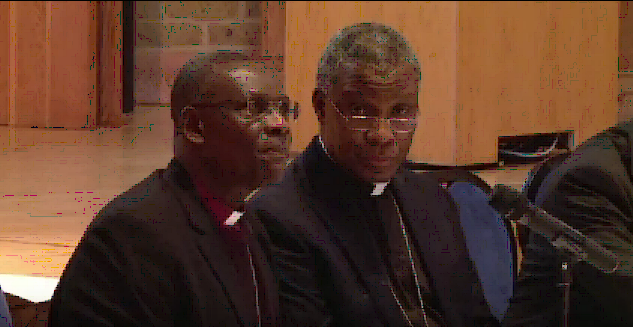Since its conclusion, the recent Primates’ meeting in Canterbury has been examined, reflected upon and covered extensively. Nevertheless, there are a few aspects that seem to have gone unnoticed. During the press conference on the meeting’s final day, a reporter asked the Archbishop of Canterbury the following:
“Is there a desire or an attempt by the church to lobby or to make their influence heard in the governments in Africa where gay people are persecuted? Where it’s a criminal offense where people are in jail for this?”
While the Archbishop of Canterbury’s response was surprising, it was Archbishop Josiah Fearon’s, the Secretary General of the Anglican Consultative Council and former Archbishop from Nigeria, response that got my attention. (the full transcript is below)
“…But generally on the continent of Africa our culture does not support the promotion of this type of life style. I know a lot of gays. But they won’t come out and start propagating it as a way of life.
“So the problem therefore on the continent of Africa generally is for strong groups from outside Africa coming to impose what is culturally unacceptable. Coming to impose it. That is where the difference is. If the West would just leave Africans within our various cultures, we know how to live together with our differences…”
Who are these “strong groups from outside Africa” Secretary General Fearon is referencing? Without knowing which groups he had in mind, I’d simply like call your attention a recent article from The Witherspoon Institute titled The UN’s Push for “Same-Sex Marriage”. The article, published January 21, details how the UN’s bureaucracy is becoming a strong arm of the LGBT lobby overseas.
“A few nations have joined UN bureaucrats in promoting same-sex marriage at the UN. As Samantha Power, the US Ambassador to the UN, has recently said, the ultimate goal of these countries is to inject LGBT issues “into the DNA of the United Nations.” The vast majority of Member States are troubled that this issue continues to show up on the agenda even though it is consistently rejected from all UN documents.”
Could the United Nations be one of those “strong groups” that is imposing what is culturally unacceptable in Africa? Over the past few years, there’s been a narrative promulgated by Western activists and media outlets that recent, so-called “anti-gay” sentiment and legislation in Africa has been ginned up by fundamentalist Christians from America. The narrative is basically that Bible-thumping, American haters are traveling to Africa and intentionally or unintentionally encouraging people to persecute, imprison and kill gays and lesbians. However, if you consider Josiah Fearon’s statements and stories like the Witherspoon Institute’s, this narrative could be not only inaccurate but dangerous. It would be a tragedy if the people and NGO’s, like the United Nations, that seek to protect the rights of those with alternative sexual orientations were really doing more harm than good.
——
*The transcript of the relevant portion of Primates’ press conference is below. Special thanks to Anglican TV for the video.
Reporter: Is there a desire or an attempt by the church to lobby or to make their influence heard in the governments in Africa where gay people are persecuted? Where it’s a criminal offense where people are in jail for this? …
Archbishop of Canterbury Justin Welby: It’s a very good question. It’s a difficult question. The basic answer is yes, absolutely, we’d love to see a change. I’d love to see a change. Perhaps I might ask Archbishop Fearon in a minute to say something about his own situation from Nigeria. I’d love to see a change. You know we have to… Quite rightly a lot of African governments say ‘thank you very much we’ve heard quite enough from the former colonial power about how we should live.’ And we have to be very sensitive to how we have abused our history.
Yes, I’d love to see a change. Yes, I’ve spoken in public about this and will continue to do so… and we want our own situation to demonstrate adequately a good example that helps overseas. The church in England, the Church of England actually was one of the first churches to campaign against the criminalization of LGBTI people back in the early sixties under Archbishop Ramsey and was very instrumental in being part of the abolition of criminal sanctions in this country. So we have a long history of saying ‘yes that really matters to us.’
But maybe…Josiah, would you like to say something?
Secretary General of the Anglican Consultative Council, Archbishop Josiah Fearon: I think I want to latch on from here where the Archbishop of Canterbury stopped. Are there gays and lesbians in Africa? Of course there are and we have always had them. But generally on the continent of Africa our culture does not support the promotion of this type of life style. I know a lot of gays. But they won’t come out and start propagating it as a way of life.
So the problem therefore on the continent of Africa generally is for strong groups from outside Africa coming to impose what is culturally unacceptable. Coming to impose it. That is where the difference is. If the West would just leave Africans within our various cultures, we know how to live together with our differences.
Now the church has a role to play in this. I agree with you. I wouldn’t support the word “lobby.” No. The primates, if you look here, this communique makes it very clear. The Anglican Church has always, from Lambeth 1998, we’ve always made room for pastoral care and concern for those who have different sexual orientations. So what I would suggest and support is let the church play a role where we begin to make everybody, irrespective of their sexual orientation, feel a part of the family we will have some respite.



